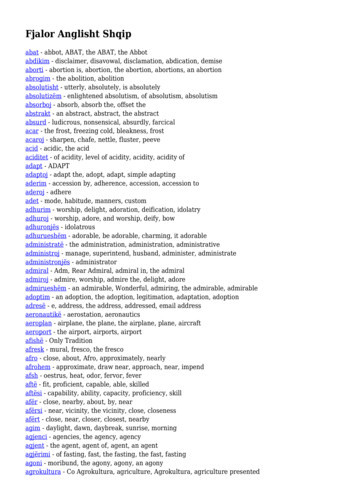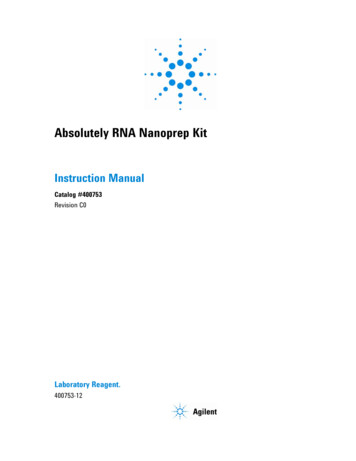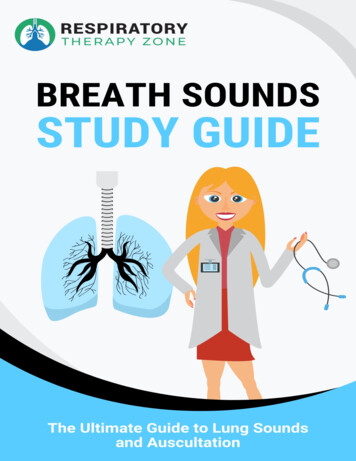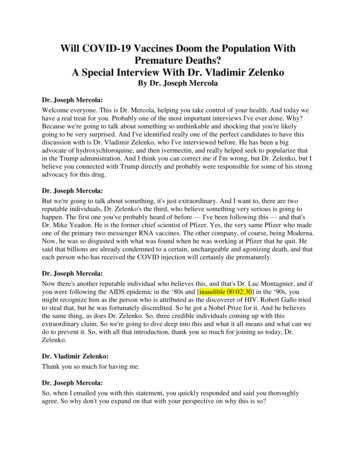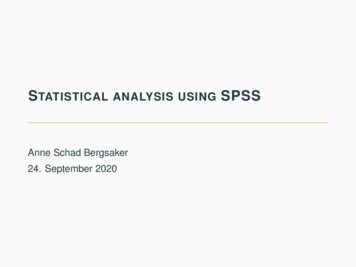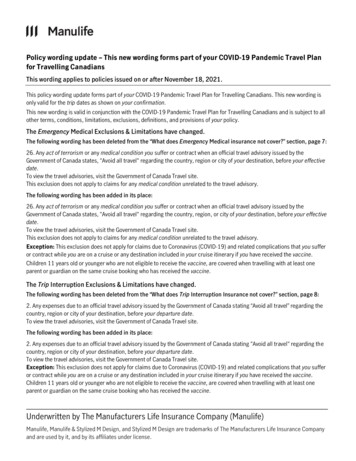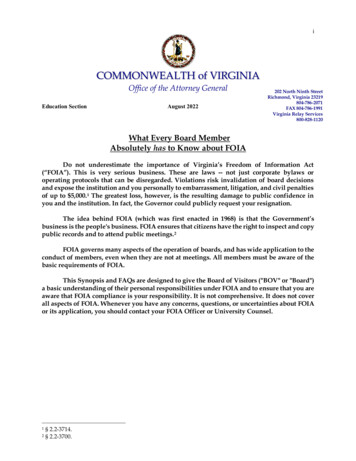
Transcription
iCOMMONWEALTH of VIRGINIAOffice of the Attorney GeneralEducation SectionAugust 2022202 North Ninth StreetRichmond, Virginia 23219804-786-2071FAX 804-786-1991Virginia Relay Services800-828-1120What Every Board MemberAbsolutely has to Know about FOIADo not underestimate the importance of Virginia’s Freedom of Information Act(“FOIA”). This is very serious business. These are laws -- not just corporate bylaws oroperating protocols that can be disregarded. Violations risk invalidation of board decisionsand expose the institution and you personally to embarrassment, litigation, and civil penaltiesof up to 5,000. 1 The greatest loss, however, is the resulting damage to public confidence inyou and the institution. In fact, the Governor could publicly request your resignation.The idea behind FOIA (which was first enacted in 1968) is that the Government’sbusiness is the people's business. FOIA ensures that citizens have the right to inspect and copypublic records and to attend public meetings. 2FOIA governs many aspects of the operation of boards, and has wide application to theconduct of members, even when they are not at meetings. All members must be aware of thebasic requirements of FOIA.This Synopsis and FAQs are designed to give the Board of Visitors ("BOV" or "Board")a basic understanding of their personal responsibilities under FOIA and to ensure that you areaware that FOIA compliance is your responsibility. It is not comprehensive. It does not coverall aspects of FOIA. Whenever you have any concerns, questions, or uncertainties about FOIAor its application, you should contact your FOIA Officer or University Counsel.12§ 2.2-3714.§ 2.2-3700.
iiTable of ContentsVIRGINIA’S FREEDOM OF INFORMATION ACT: SYNOPSIS .1Documents and Email .1Meetings .1What does FOIA do? .4FOIA requires that some records be withheld and some meetings be closed, right? .4Who does FOIA apply to? .4MEETINGS .5Meetings Generally.5Can we meet without telling anyone? .5Can less than a quorum of the Board – say three or four members – get together informally to discussaffairs of the institution? .5Can’t I even go to a cocktail party or dinner with two (or more) other Board members? .5The Board wants to take a bus tour of campus and our new facilities during a break at our Boardmeeting. Any problem with this? .6Our Board members routinely serve on ad hoc committees or task forces. Must the institutionadvertise these meetings? .6We hold an annual retreat. This is a very informal work/training session. No business is conductedand no action is taken. Do we have to advertise this meeting and allow the press and members of thepublic to attend?.6Who can come to our meetings? .6Do we have to tape record our meetings? .7Do we have to take minutes? .7Closed Meetings .7What are the exceptions to open meetings? When can we hold a closed session? .7When are we required to go into closed session? .8What must we do to go into closed session? .8What if we are in open session with only the BOV and President are present, and we want to discusssomething that we would ordinarily discuss in closed session. Can’t we do that without goingthrough the formalities? .9What can we discuss in closed sessions? .9Who is permitted to go into a closed session with the Board? .9Who decides when closed session is appropriate? .9Can we vote in closed session? . 10What do we do when we have finished our closed session discussions? . 10May Board members talk with other people about matters that were discussed in closed session? . 10Should minutes be taken in closed session?. 11What is an executive session? . 11Meetings Using Electronic Communication Means . 11May we hold a meeting by telephone or video? . 11May members of the board call in from different locations? . 12May a member call in from wherever he or she happens to be at the time of the meeting? . 12
iiiIf a remote location that is open to the public is noticed, then the member decides to attend at anotherlocation, may we then omit the original location? . 12If something comes up after the three working days’ notice that prevents a board member’s physicalattendance at a meeting, can a board member still participate? . 12May we hold all of our meetings as all-virtual meetings? . 12Must the all-virtual meeting be recorded or minutes kept? . 12What if a phone or video goes out or there is some other problem with communication during themeeting? . 12May a member call in on the telephone and participate in discussion at a meeting so long as themember does not vote? . 13What types of meetings may be held as all-virtual meetings? . 13May we use email to communicate between meetings? . 13Emergency Meetings . 14What if the University or Board has an emergency? Can we meet without three days’ notice? . 14May we hold an emergency meeting without 3 days’ notice? . 14If an emergency meeting is held, must public access be provided? . 14RECORDS . 14What does FOIA require regarding public records? . 14What is a “public record”? . 14Do FOIA requests have to be in writing? . 15Are there exceptions to the requirement that we produce requested records? . 15How long do I have to produce records in response to a FOIA request? . 15Would a FOIA request require me to give an account of some event I witnessed, for example, write adescription of a discussion I had with another Board member? . 15What about my personal documents, including for example, handwritten notes such as those frommeetings or discussions with alumni, email at home on my personal computer, etc.? . 16PENALTIES . 16So what if we violate FOIA? What’s the big deal? . 16
1VIRGINIA’S FREEDOM OF INFORMATION ACT: SYNOPSISDocuments and Email FOIA broadly guarantees public access to public records, including your notes andcorrespondence concerning University business. This includes e-mail, text messages,voice mail message, digital documents, and even preliminary drafts of documents. 3 Thereare numerous exemptions, which are all fact-specific. 4 Always be sensitive to the potentialfor public disclosure of your written communications. Any request by the press or anyperson to inspect your public records should be brought immediately to the University’sattention to ensure a timely and proper reply. Oral and informal requests to you areconsidered legitimate FOIA requests. Any request for public records, regardless of therequest, is a FOIA request.Meetings Unlike the private sector, the public (including employees of the institution) and presshave a right to be present at your board and committee meetings. 5 All meetings of the Board, including its committees and subcommittees, in addition to anyother group or entity appointed by the Board to advise it or exercise delegated power,must be conducted in an open meeting with at least three working days advance publicnotice of meeting time and location. 6 It does not matter that a meeting involves no actualvoting or transaction of business, such as, for example, retreats. 7 A meeting exists in theeyes of the law whenever three or more Board members meet and discuss any Universitymatter. 8 Voting on any University action must always be conducted in open session. 9Voting by secret ballot or proxy is prohibited. 10 Once properly convened and in open session, discussions regarding certain limited topicscan be held in closed session. 11 The justification for closed session does not depend onwhether a subject may be very sensitive or political, or that a confidential setting mightencourage more candid exchanges. Closed sessions must be specifically authorized byFOIA. 12 Also, to go into closed session, certain specific procedural steps must be taken, including: 13oAdvance public notice for the meeting must have been given.§ 2.2-3700.See § 2.2-3705.1-3705.8.5 § 2.2-3700.6 § 2.2-3707.7 § 2.2-3701.8 § 2.2-3701.9 § 2.2-3711(B).10 § 2.2-3710.11 § 2.2-3711.12 § 2.2-3711.13 For “closed session” procedures, see § 2.2-3712.34
2oooooo During the meeting in open session, the Board must vote on a motion authorizinga closed session. This public motion must reasonably identify both the purpose forthe closed session and the subject for discussion.While in closed session, the discussion must be related only to the topic identifiedin the public motion. Take care not to digress into any unrelated areas or othersubjects, even if those topics would be eligible for closed session with a propermotion. It is your responsibility both as a matter of law and common sense thatyou stick to the subject matter described in the motion authorizing the closedsession.Any action the Board wishes to take as a result of discussions in closed sessionmust be voted on in open session.When discussion in closed session is adjourned, the chair of the meeting shouldimmediately direct the opening of doors and inviting public/staff into the roomfor open session.Once back in open session, each member of the body will then be required tocertify publicly that his or her discussion in closed session was proper and relatedto the permitted subject set forth in the motion convening the closed session.The law requires you to invite your University Counsel to all BOV and committeemeetings, including all closed sessions. This also protects the Board in the eventthe discussion in closed session is questioned.There are two ways the Board can meet by electronic communications means (such as bytelephone or video conference):ooFirst, if the Governor has declared a state of emergency (or the Board’s locality hasdeclared a local state of emergency), and the catastrophic nature of the declaredemergency makes it impracticable or unsafe to assemble a quorum in a singlelocation, the Board can meet by electronic communication means as long as thepurpose of the meeting is to provide for the continuity of operations of the publicbody or the discharge of its lawful purposes, duties, and responsibilities. Thepublic must be given notice of such a meeting at the same time as Board members,using the best available method given the nature of the emergency. The Boardmust also make arrangements for public access to such meeting through electroniccommunication means used by the public body. 14Second, the Board may hold an “all-virtual” electronic meeting provided that (1)the all-virtual nature of the meeting and the means for public electronic access tothe meeting are disclosed in the public notice of the meeting; 15 (2) the electroniccommunication means used for the meeting must allow the public to hear allmembers of the Board or committee participating in the meeting and, when audiovisual technology is available, to see the members of the Board or committee aswell; (3) the Board staff monitor the electronic communication means during themeeting and ensure that any interruption of audio or video results in a suspensionof action at the meeting until repairs are made and public access is restored; and(4) the proposed agenda and all agenda packets (including, unless exempt, allmaterials furnished to members for the meeting) are made available to the public§ 2.2-3708.2 (effective September 1, 2022).Once public notice has been given, the electronic communication means for the meeting cannot bechanged without issuance of a new meeting notice.1415
3oo in electronic format at the same time that such materials are provided to Board. 16There are two important caveats to the all-virtual meeting rule:During all-virtual meetings, no more than two members of the Board or committeemay be together in one remote location unless that remote location is open to thepublic to physically access it.The Board or any individual committee may not convene an all-virtual meeting i)more than two times per calendar year or 25% of the meetings held per calendaryear rounded up to the next whole number, whichever is greater; or ii)consecutively with an all-virtual meeting.An individual Board member may participate in a Board or committee meeting byelectronic communication means is if before or on the day of the meeting, a board membernotifies the chair that (1) the member (or a family member in the Board member’s care)has a temporary or permanent medical condition that prevents the Board members’physical attendance; (2) that the Board member’s principal residence is more than 60 milesfrom the meeting location identified in the public notice for such meeting; (3) that theBoard member is unable to attend the meeting due to a personal matter (which must bespecifically identified). However, a Board member may not use remote participation dueto personal matters more than two meetings per calendar year or 25 percent of themeetings held per calendar year rounded up to the next whole number, whichever isgreater. 17 In addition:The Board must have: adopted a written policy allowing for and governingparticipation of its members by electronic communication means, including anapproval process for such participation, which must be applied strictly anduniformly, without exception, to the entire membership and without regard to theidentity of the member making the request or the matters to be considered or votedon during the meeting;o There must be a quorum of the Board or committee physically assembled at theprimary meeting location; ando The Board must makes arrangements for the voice of the remote participant to beheard by all persons at the primary meeting location.Whenever a member wants to participate by telephone (or other means of electroniccommunication), please consult with University Counsel.o1617§ 2.2-3708.3(C) (effective September 1, 2022).§ 2.2-3708.3(B) (effective September 1, 2022).
4Frequently Asked QuestionsFOIA GENERALLYWhat does FOIA do?In general terms, FOIA defines what a meeting is and requires that all meetings be opento the public. 18 It also prohibits discussion of public business among members outside ofmeetings. 19 There are, however, exceptions to these general meeting requirements that eachmember should be familiar with. 20FOIA also requires that all public records (with some limited exceptions) be madeavailable upon request to members of the public for inspection and copying. 21All public records and meetings are presumed open, and the Board and the institution havethe burden always of being prepared to prove that there was a legitimate reason for closingmeetings or withholding records. 22FOIA also requires that its open government provisions be liberally construed, and itsexemptions be narrowly construed. This means that you should always err on the side of leavingmeetings open rather than closing them, and releasing documents rather than withholdingthem. 23Whenever you have specific questions about FOIA or its requirements, please do nothesitate to contact counsel.FOIA requires that some records be withheld and some meetings be closed, right?Wrong. The exemptions to disclosure of records and for closed sessions are discretionary,not mandatory. There is no penalty for releasing records that could be withheld under a FOIAexemption (though other provisions of federal and state law, such as FERPA, may prohibitdisclosure). There is also nothing that says a meeting must be closed just because it could be closedunder a meetings exemption under FOIA. Please contact counsel if you have concerns aboutfederal or state law that might prohibit release of information.Who does FOIA apply to?FOIA applies to all public bodies. In the context of public institutions of higher education,that means that FOIA applies to the institution and all of its officers (including members of theBoard) and employees. 24 It also applies to the operations of the Board itself together with all of its§ 2.2-3700.§ 2.2-3707.20 §§ 2.2-3707.01 and 2.2-3711.21 §2.2-3704.22 § 2.2-3700(B).23 § 2.2-3700(B).24 § 2.2-3700.1819
5committees and subcommittees, and any other groups or entities appointed by the Board toadvise the Board or exercise delegated functions.MEETINGSMeetings GenerallyCan we meet without telling anyone? 25FOIA requires that all meetings of the Board or any committee or subcommittee beadvertised to the public for at least three working days. The notice requirements of FOIA are veryspecific. The secretary to the Board will handle the details of complying with these. Members ofthe Board, however, should be aware that any meeting called must be far enough in advance thatthe secretary has time to prepare the notice properly and advertise the meeting for three workingdays in the various ways required by FOIA. Any materials the institution supplies to Boardmembers before the meeting also must be supplied to the public at the same time, with theexception of documents that are specifically exempt under FOIA from disclosure. 26 This includesany materials one Board member sends to all other members.If your bylaws call for more notice for meetings than FOIA does, you must comply withthe stricter provisions of the bylaws.Can less than a quorum of the Board – say three or four members – get together informally todiscuss affairs of the institution?No. A gathering of three of more members of the Board where business is discussed isillegal, unless the gathering has been properly advertised for at least three working days as ameeting. It does not matter that a quorum was not present. 27 If more than two Board membersserve on an institution-related foundation's board, FOIA will likely be violated.This prohibition is generally against three or more members discussing public business.Two members may discuss public business in person, on the phone, or otherwise, with onenotable exception. If those two members constitute either the entirety or a quorum of a committeeor subcommittee, or other group that has been designated by the Board or Board Chair to advisethe Board or has been delegated some responsibility by the Board, then any discussions betweenthem must be properly advertised as a meeting. Otherwise, the gathering is an illegal “meeting”under FOIA. 28Can’t I even go to a cocktail party or dinner with two (or more) other Board members?Yes, of course you can. While there, you may even discuss business with one other memberat a time.For details see § 2.2-3707.§ 2.2-3707(F).27 § 2.2-3707.28 § 2.2-3701.2526
6Three members, however, may not discuss public business together, and a third membermay not listen to the conversation of the other two.Please keep in mind that this prohibition applies at all times and in all places – including,for example, lunches, dinners, and social occasions held in conjunction with Board meetings orat annual professional conferences. For example, if a Board holds a luncheon between themorning and afternoon sessions of a meeting, the Board must advertise the luncheon as a meetingand have the luncheon open to members of the public, or ensure that Board members do notdiscuss any public business during the luncheon. That’s a difficult task, but a mandatory one. 29The Board wants to take a bus tour of campus and our new facilities during a break at ourBoard meeting. Any problem with this?No, provided that arrangements are made also for members of the press and public to bepresent whenever any institutional business is discussed. That means you might need a big busif any discussions will take place on the bus. (This was a real-life problem at another institution.) 30Our Board members routinely serve on ad hoc committees or task forces. Must the institutionadvertise these meetings?If three or more Board members are on a committee, the meetings must be noticed. Youcan avoid noticing all of these meetings by having only one or two board members on thecommittee or task force.We hold an annual retreat. This is a very informal work/training session. No business isconducted and no action is taken. Do we have to advertise this meeting and allow the pressand members of the public to attend?Absolutely. Any get-together of three or more members at which the business oroperations of the institution are discussed is a “meeting” under FOIA. Retreats and work sessionsare no exception. They must be properly advertised, and must be open unless an exemptionapplies to a specific matter under discussion. 31Who can come to our meetings?Anybody who wants to may attend your meetings. All meetings must be open to thepublic. Any member of the public (including, of course, press, employees, and students) has aright to attend, listen, and make a video or audio recording of any meeting. The Board can putreasonable restrictions on recording to ensure that actions of the press or public do not disruptthe meeting.You will, at times, have outside consultants present at your meetings. They will not befamiliar with FOIA and may expect or request confidentiality that FOIA does not permit. TheBoard and staff should provide these consultants with information that will reduce the conflictbetween their expectations and what FOIA permits.§ 2.2-3701.§ 2.2-3700.31 § 2.2-3701.2930
7Do we have to tape record our meetings?No. Recording meetings is not required. However, proper minutes must be taken. Draftminutes and final minutes must be posted to the institution’s website and the CommonwealthCalendar within seven working days of final approval. 32 The secretary to the Board will ordinarilyhave this responsibility.Do we have to take minutes?Yes. FOIA requires that minutes be taken of every meeting, including retreats or worksessions. Minutes must include (a) the date, time, and location of the meeting; (b) the members ofthe public body recorded as present and absent; and (c) a summary of the discussion on mattersproposed, deliberated or decided, and a record of any votes taken. 33 Also, minutes, includingdraft minutes that fairly reflect actions taken, must be posted on the website and theCommonwealth Calendar within 10 days following the meeting. 34Closed MeetingsWhat are the exceptions to open meetings? When can we hold a closed session? 35FOIA has 54 exceptions to the open meetings requirement, not all of which will apply toevery public body. The exceptions most likely to be utilized by Boards to justify closed sessionsare:(1) the personnel exception: discussion, consideration, or interviewing of prospective candidatesfor employment; or the discussion of assignment, appointment, promotion, performance,demotion, salaries, discipline, or resignation of specific employees. This exception does not applyto discussion of members of the Board themselves. It is also inapplicable to discussions of generalpolicy or operations – for example, reorganization – that would refer to reassignment or layingoff of employees – unless the discussion centers upon specific employee(s).(2) the scholastic record exception: discussions or consideration of admission or disciplinarymatters, or other matters that would involve disclosure of information in scholastic records (asdefined in FOIA) of specific student(s). Generally speaking, however, the student or his lawyer isentitled to attend those closed sessions.(3) the real property exception: discussion or consideration of the acquisition or disposition ofreal property where open discussion would adversely affect the bargaining position ornegotiating strategy of the institution. This exception does not apply once the real property hasbeen acquired or disposed of, and does not include potential use of real property.(4) the investment exception: discussion or consideration of the investment of public funds wherecompetition or bargaining is involved, where, if made public initially, the financial interest of the§ 2.2-3707.1.§ 2.2-3707.34 § 2.2-3707.1.35 For full list of exceptions, see § 2.2-3711(A). The statute does refer to the exemptions for "closedmeetings" but as will be discussed, a more accurate description is that they are a “closed session” within ameeting. The term "closed session" will be used in these FAQs.3233
8institution would be adversely affected. This exception might occasionally be invoked duringdiscussion of endowment funds investment.(5) the legal advice and work product exceptions: consultation with legal counsel for legal adviceon specific matters requiring legal advice, and consultation with counsel and briefings by staffmembers or consultants pertaining to actual or probable litigation, where such consultation orbriefing in open meeting would adversely affect the negotiating or litigating posture of the publicbody.(6) the development exception: discussion or consideration of matters related to gifts, bequests,and fund-raising activities, and grants and contracts for services or work to be performed by theinstitution.(7) the honorary degree exception: discussion or consideration of honorary degrees or specialawards.(8) the terrorism or cybersecurity exception: discussions relat
VIRGINIA'S FREEDOM OF INFORMATION ACT: SYNOPSIS . Documents and Email FOIA broadly guarantees public access to public records, including your notes and correspondence concerning University business. This includes e-mail, text messages, voice mail message, digital documents, and even preliminar y drafts of documents. 3 There
